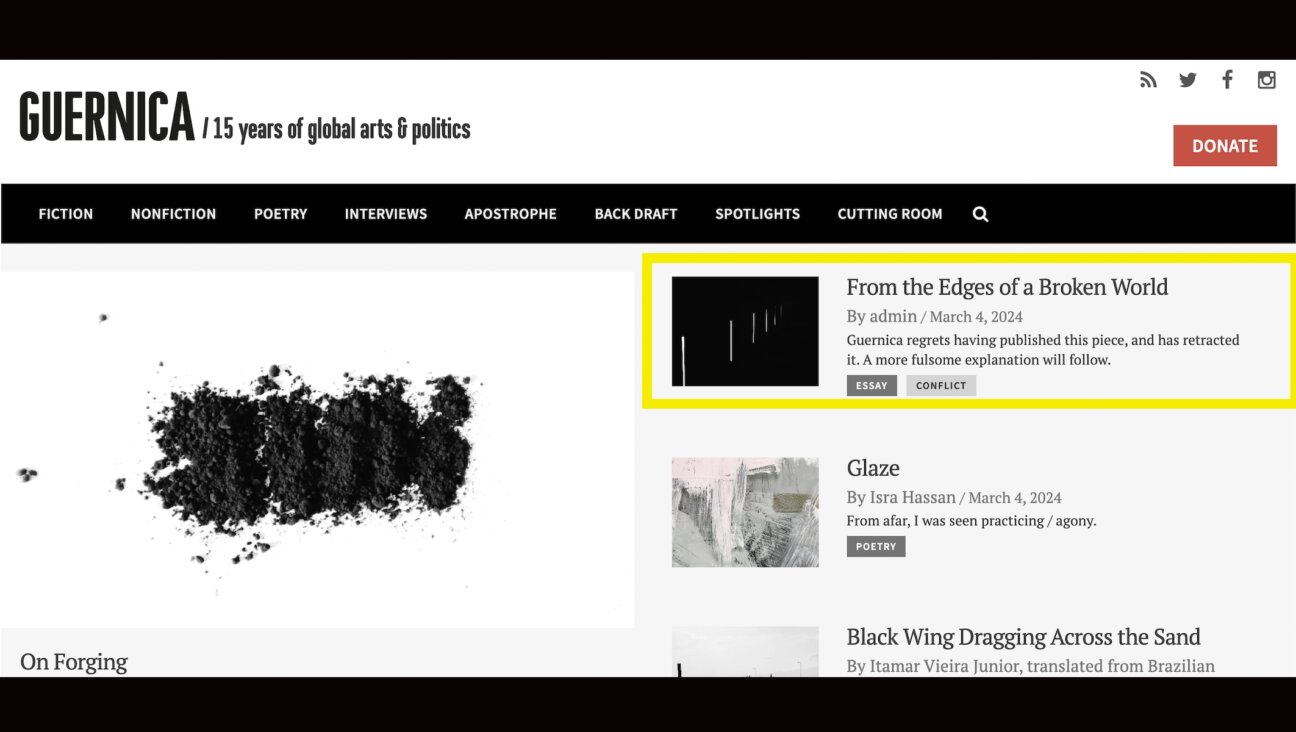The Jewish Lonely Hearts Who Meet Online

Image by Lily Padula
When a Jewish baby is born, it is traditional to say, “May she/he be worthy of ascending to Torah, the wedding canopy and good deeds.” Or, as we single Jews find ourselves saying: “Thanks for the good wishes, but what’s with all the pressure? Two out of three ain’t bad, and I’m trying. I’m even on JDate.”
The brand has become the catchall for Jewish dating experiences worldwide. You can’t mention it in conversation without someone groaning in frustrated recognition, and someone else saying, “Well, my cousin/friend/person I know on Facebook met their spouse there,” which is usually met with an additional groan.
Many still-singles see the billboards on Pico-Robertson or Times Square and stifle something between a laugh and a sob at taglines like, “Where finding love is easier than spelling ‘Chanukah/Hanukah/Hannukah.’” When a site claims that something we haven’t been successful at is “easier” than something that’s already fairly easy, it constitutes a condemnation, or a negation of our efforts. It must be us, it says. We must be doing something wrong.
If only finding love were as easy and low-stakes as Hebrew-to-English transliteration. But it’s not, and JDate’s spotlight on successful couplings doesn’t mean that online dating works for everyone.
While I didn’t find a relationship on the site, I did find a paradise of stories. One guy revealed five minutes into our date that, the previous night, he had been held up at gunpoint. After a few hours of talking, we left the bar; he fled into the night, leaving me to walk through the sketchy downtown streets alone. Another said it was so wonderful and rare to be out with someone real, smart and funny; we had two long, chatty dates before he vanished completely, emerging a few years later to marry someone I know.
I used to write a lot about the state of the single Jew, and the puzzling challenge that we presented to contemporary American Jewish life: How could we possibly have gotten to age 25/30/35 or — heaven forbid! — 40+ without finding a partner and taking our place in the replacing-lost-Jews tradition of our people? I had hoped to generate conversation and understanding, and recalibrate how the Jewish community in general created meaningful space for its singles. While some are having this conversation, many others are more interested in finding someone or something to blame.
The establishment blames singles for “delaying marriage” or being “too picky,” and we often blame ourselves, as well as the sites where we do our searching. For some, JDate itself is the impediment, churning out “matches” that are inappropriate or incompatible, and creating the perception of endless choice that encourages users to play the field until they find perfection. For others, repeated stereotypes like “All Jewish women are overweight and superficial” and “All Jewish men are short mama’s boys” created a cocktail of negativity that continues to poison the dating pool. But whatever the challenges, nearly all the single people I’ve met have quit JDate (and other dating sites) multiple times in frustration, only to rejoin months later with a sigh, accepting their fate and merging into the multitudes.
As single people, we are like those trying to succeed in showbiz or finding amazing unmetered street parking; since we know enough people who have been successful, we internalize it as mantra: “It happened to them, it can happen to me.” But sometimes you don’t win the lottery even if you buy a ticket ($39.99 for one month, with deals for multiple months purchased), even if you’ve been buying tickets for a long time and you really, really deserve it.
But we still “have to be in it to win it,” as the old New York City lottery advertisement ran. So when I buy that lottery ticket, as I still do from time to time, and I do not win, I try not to turn the blame inward. But I do assess my own behavior, and try to treat people with respect. I believe that if we say “I’ll call you,” we should. I believe that if we’re not interested, we should say so (nicely, because we’re all fragile, especially those who have been here awhile).
While dating sites could certainly improve their offerings, I understand that on JDate — or OKCupid, or HowAboutWe, or Coffee Meets Bagel, or SawYouAtSinai, or JDate’s new would-be rival Jzoog — each page-view represents a person looking for something important and life changing. We join these sites because we are still dreaming, still harboring the self-renewing hope. And this adherence to hope — however illogical or unjustified — is the true miracle, regardless of how we spell Hanukkah.
Esther D. Kustanowitz, a writer based in Los Angeles, has contributed to the Forward, the New York Jewish Week, the Jewish Journal and Haaretz. She blogs at MyUrbanKvetch.

I hope you appreciated this article. Before you go, I’d like to ask you to please support the Forward’s award-winning journalism this Passover.
In this age of misinformation, our work is needed like never before. We report on the news that matters most to American Jews, driven by truth, not ideology.
At a time when newsrooms are closing or cutting back, the Forward has removed its paywall. That means for the first time in our 126-year history, Forward journalism is free to everyone, everywhere. With an ongoing war, rising antisemitism, and a flood of disinformation that may affect the upcoming election, we believe that free and open access to Jewish journalism is imperative.
Readers like you make it all possible. Right now, we’re in the middle of our Passover Pledge Drive and we need 500 people to step up and make a gift to sustain our trustworthy, independent journalism.
Make a gift of any size and become a Forward member today. You’ll support our mission to tell the American Jewish story fully and fairly.
— Rachel Fishman Feddersen, Publisher and CEO
Join our mission to tell the Jewish story fully and fairly.
Our Goal: 500 gifts during our Passover Pledge Drive!

























